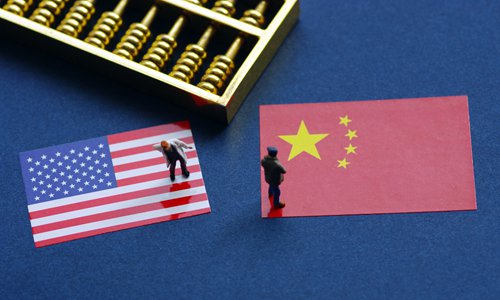US-China relations: What is the next transition?

Photo: VCG
From trade and tech wars to maritime disputes in the South China Sea, a troublesome downward spiral casts doubt on the future of US-China relations. Where is the bottom? The US designates China as a "strategic competitor." However, what does that mean? Are there no longer overlapping areas of shared interests for Sino-US cooperation, or is there a "new normal?"
In the US, there is a strong bipartisan consensus that the core assumptions and expectations that guided China policy in the past are no longer valid. The notion of China as a partner, a "responsible stakeholder" with whom the US broadly cooperates, and manages differences, is gone. Familiar Cold War habits of mind have taken over, with China replacing the USSR in the mindset of many US strategists.
There is a one-dimensional view that China's economic and geopolitical behavior is harming US core interests and also seeks to undermine US interests in Asia and beyond. Some advocate economic divorce. President Donald Trump sees his "tough on China" trade war as an asset for his 2020 re-election campaign.
This may be acceptable in US politics, but as a policy it is incomplete. The current trajectory is not sustainable. US-China ties are in a protracted transition period and it may take a major crisis or near-death military confrontation before a new stasis is reached.
Why? China is the second largest economy, top trading power and capital exporter, a major military power and a nuclear weapons state. That is a reality, whether the US likes it or not.
Even if China were playing by all the rules the US preferred, there would still be discomfort, a problem coming to terms with China's re-emergence after seven decades of US primacy in the Asia-Pacific. This is part of a broader difficulty the US has had in adjusting to a transition to a new "polycentricism," with the center of economic and strategic gravity moving from West and North to East and South.
To the US, China's assertiveness since the 2008 US financial crisis, whether its growing maritime capabilities and actions or the Belt and Road Initiative, is seen as a zero-sum game. However, are we on a "Thucydides trap" path toward war? Not necessarily.
Even at the height of the Cold War, there was a strategic framework for stability in US-USSR relations. It took several crises, and near nuclear war in the 1962 Cuban Missile Crisis before Washington and Moscow relations stabilized. Sooner or later, the US and China will need to reach a modus vivendi.
Unlike the USSR, China's economy is not autarchic, but one deeply integrated into the world economy and a driver of global economic growth. US-China trade reached almost $660 billion in 2018.
Economic divorce is not an option in a complex economy of global supply chains. However, the US-China economic relationship will be diminished, as techno-nationalism in both countries curbs Chinese FDI in the US and vice versa. Nonetheless, relations between the world's two largest economies will shape the global economic system.
The question is, what will be the new baseline of Sino-US relations. Economics has been a key pillar of US-China relations. The outcome of current trade talks is key to putting a floor under bilateral relations. If Beijing implements the reforms agreed to at the 19th National Congress of the Communist Party of China, the majority of issues which the US seeks change -- albeit in an unnecessarily belligerent, and confrontational way -- would be addressed and likely result in a mutually beneficial trade deal.
A US-China trade deal could begin a reset of the relationship, and perhaps facilitate efforts for much-needed WTO reform, which the US, China, EU, and Japan support. US-China agreements on the governance of technology may also influence WTO rules pertaining to e-commerce and emerging AI technology.
A more stable economic relationship could change the tone of contentious geopolitical issues. There are vital areas of overlapping interests that could be a source of US-China cooperation: the future of the Korean Peninsula, a peace settlement in Afghanistan and the fragile Middle East. In addition, there are global issues like counter-terrorism and the environment, to global infrastructure where room for cooperation exists.
Finally, a framework for strategic stability would benefit both sides. Conduct standards covering AI, maritime, and space, for example, would make sense.
None of this will be quick or easy, but the process needs to begin. There is a compelling need for a new kind of sobriety, beyond the emotional angst on both sides. The alternative, however, is something neither the US or China would want to contemplate.
The author is a senior fellow at the Brent Scowcroft Center for International Security at the Atlantic Council and its Foresight, Strategy and Risks Initiative. opinion@globaltimes.com.cn. Follow him on Twitter @Rmanning4